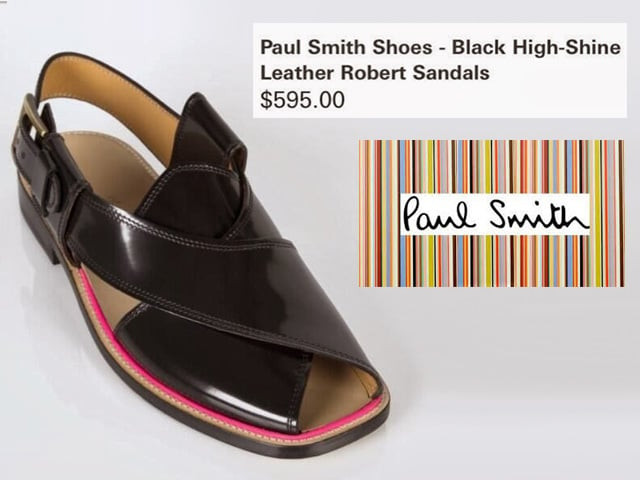 Source: Paul Smith website
Source: Paul Smith websiteExcept oops, wait a second, this isn’t an original design by Paul Smith!
They are in fact Peshawari chappals (slippers) that have been made and sold in Pakistan for the last, oh, 200 years?
Here is a fine example of the Peshawari chappal from Zalmay, a Peshawar shoe store. They make these shoes to sell abroad, given the price in GBP, 27 pounds. Zalmay doesn’t have a monopoly on this design either - it is ubiquitous. But I bet all the shoemakers in Pakistan are wishing they’d applied a trademark to this design right about now...
 Source: Zalmay
Source: ZalmayIt’s true that fashion designers have been inspired by different cultures and traditions throughout time. But it is important to acknowledge the source of the inspiration which Paul Smith can easily do by noting that the design of the Robert Sandal is not original but in fact worn by Pashtun men all over Pakistan. You couldn’t exactly call it intellectual property but at least credit would have been given where credit was due.
Even more ethical would be for Paul Smith to work with local shoemakers to source the shoes directly from Pakistan. It would also have boosted the local economy and could have been a great example of British-Pakistani cooperation in trade.
Still, though, when this has been done in the past, local craftspeople get paid a pittance for their work - in India, sometimes less than 100 rupees a day, where the Kohlapuri chappal has been similarly claimed by western fashion designers.
In the same vein, western companies have also patented basmati rice and turmeric in order to turn huge profits because of these items’ popularity and possible health benefits for developed nations.
There’s nothing wrong with appreciating what we produce indigenously or even wearing it out of admiration for its beauty. But we in Pakistan need to learn to protect our local customs, traditions and products from being exploited by those who claim that nothing good can come of our culture. They cannibalise the best of it in order to make money and nothing good can come of that for us at all.
You may call it a Paul Smith original or a Peshawari chappal, but you know what I call it?
Cultural appropriation.
Or, in layman’s terms, ‘stealing our cultural icons and pretending that you came up with them for huge profits without acknowledging, or renumerating, the source, or inspiration, of your design’.
This post originally appeared here.
Note from the Editor:
Dear Readers,
After this blog post, a petition filed on change.org and the reaction received, Paul Smith updated their website and recognised that the shoes in question were in fact inspired by Peshawari Chappals.

Congratulations!
All the best,
The Express Tribune Blogs team.



COMMENTS
Comments are moderated and generally will be posted if they are on-topic and not abusive.
For more information, please see our Comments FAQ